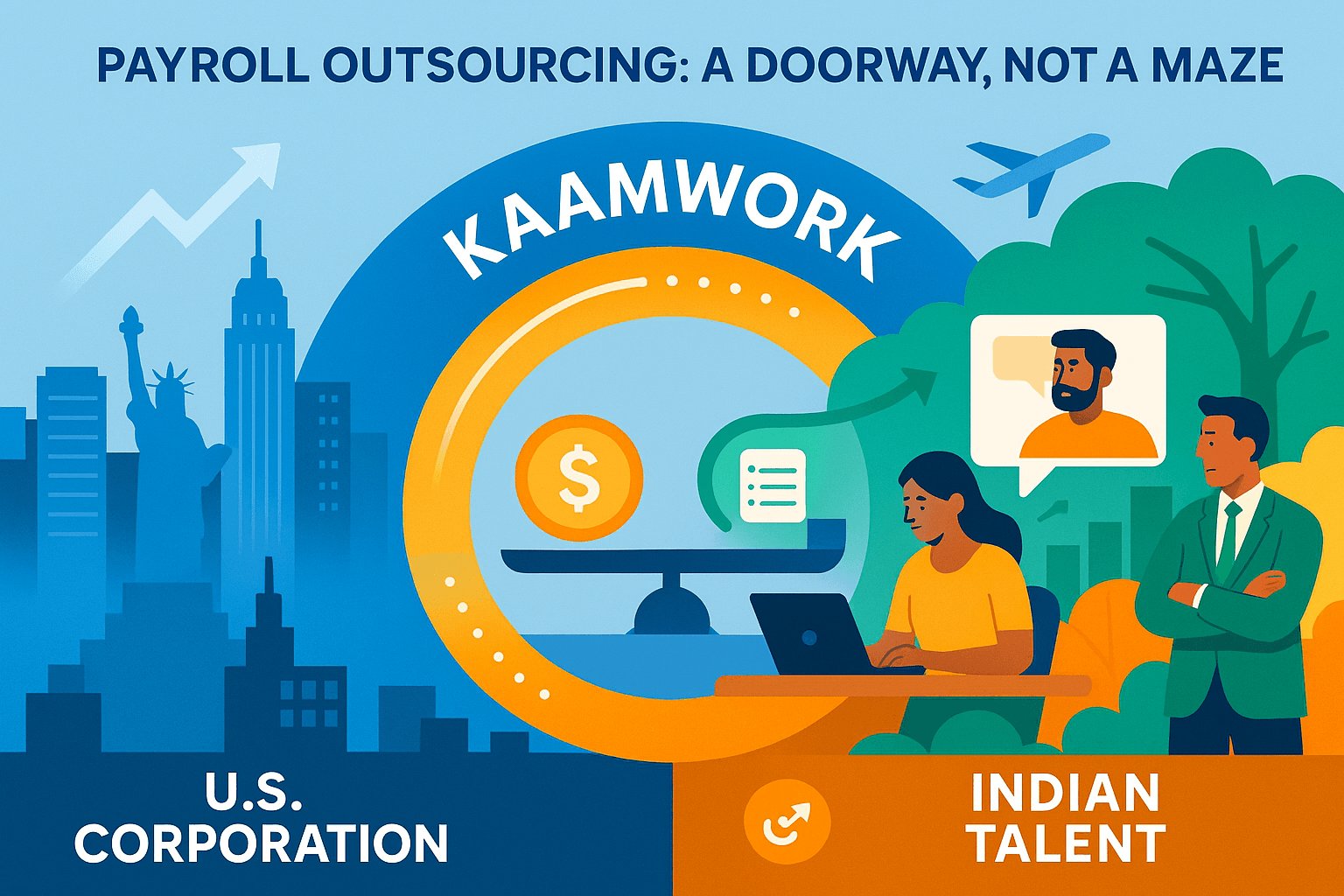Do you actually need a “recruitment agency license” to hire in India? What global companies do when they build their own teams
Hiring in India doesn’t need a recruitment agency license. Learn how global companies use EOR or entities to build compliant teams without delays.
ByNilesh@kaam.work / September 12, 2025 / 6 min read

Let’s cut through the confusion. Global employers expanding their work into India often get stuck on the wrong question: “Do we need a recruitment agency license in India?”
The short answer? No, you don’t. However, the confusion is real. And it’s costing companies months of delays and thousands of dollars in unnecessary registration and legal fees for a license that is not even required in the first place.
That license is meant for agencies that recruit workers on behalf of others, especially for overseas placements under India’s Emigration Act. If you’re hiring employees to work directly for your company in India, that license has nothing to do with you.
At Kaamwork, we’ve seen a better way. Companies use our EOR model to hire top talent directly under their own brand. No recruitment license needed. Just direct hiring that works.
In this guide, we’ll clear up exactly what licenses you actually need (spoiler: fewer than you think), and how smart companies like Microsoft, Goldman Sachs, and now OpenAI are hiring top talent directly from India - without the bureaucratic nightmare.
Let’s break this down step by step.
What does a “recruitment agency license” actually cover?
First, what counts as a recruitment agency in India? In India, a recruitment agency is like a connecting hub that finds and places workers for other companies. Think staffing firms, headhunters, and placement agencies that match candidates with employers. These agencies need a Recruiting Agent (RA) license issued by the Protector General of Emigrants (PGE).
Who needs a license
- Agencies recruiting Indian citizens for jobs outside India.
- Companies that connect job seekers with employers in other countries, such as staffing agencies, recruitment businesses, and so on.
- Consultants who charge for help finding jobs abroad
Who does not need one
- Employers hiring their own teams in India.
- Companies using an Employer of Record (EOR) to employ staff compliantly on their behalf.
- Multinationals setting up subsidiaries to directly manage local employees.
When you are building your own workforce, that’s completely different from placing workers at other companies. In such cases, no agency license is required.
Common mix-ups to avoid
Many companies confuse recruitment agency licenses with actual employer requirements. Don’t make this mistake.
Here’s what’s actually required for lawful hiring in India:
- Shops & Establishments registration – state-level requirement for all offices.
- Social security registrations – Provident Fund (PF) and Employee State Insurance (ESI).
- Contract Labour (CLRA) rules - It applies when you use third-party contractors on-site.
These are more like employer obligations that every company hiring in India is required to fulfill. They’re not agency licenses.
What you actually need to hire your own team in India?
Now, if you choose to ditch the agency setup that commands a recruitment agency license in India, here are the actual requirements for hiring your own team in India:
Pick your hiring rail
As discussed in the beginning, you have two choices here:
Option 1: Incorporate a local entity (The ownership route)
You get full ownership and control. However, it is slower to start. Therefore, expect a minimum of 6-12 months for setup and approvals.
Best for: Companies planning to hire 50+ employees within 18 months, those needing local business operations, or businesses requiring direct IP ownership.
Option 2: Use an EOR (Employer of Record) - The speed route
Start immediately with compliant payroll and contracts. Convert to your own entity later when you’re ready to scale.
| Milestone | EOR Route with Kaamwork | Entity Route |
|---|---|---|
| First hire | 24–48 hours | 6–12 months |
| Compliance + Filings (CA/Law Firm) | 0% | 5% |
| Payroll running | Day 1 | Month 8–12 |
| Payroll Benefits active | Day 1 | Month 10–15 |
| Tax benefits in the US | 20% (assuming initial equity investment in Indian entity) | None |
Most smart companies start with EOR to begin hiring within weeks, then transition to their own entity once they hit 50-100 employees. I mean, why wait a year when you could be building competitive advantages today?
Core employer registrations
Now, whether you choose the long way (Option 1) or EOR, there are certain non-negotiable registrations. And understanding them is important to protect your business.
Registrations and U.S. Equivalents
| Registration Type | U.S. Equivalent | Purpose | Timeline |
|---|---|---|---|
| Shops & Establishments | Business license | State-level business registration | 15–30 days |
| EPF (Employee Provident Fund) | 401(k) + Social Security | Mandatory retirement savings plan: 12% employee + 12% employer = 24% total | 30 days |
| ESI (Employee State Insurance) | Health insurance | Medical coverage for employees earning < ₹25,000/month | 30 days |
| Professional Tax | State income tax | Varies by state (₹200–2,500 annually) | 15 days |
| Gratuity Registration | Severance fund | After 5 years, employees receive 15 days of salary per year of service (required for 10+ staff, ~4.81% of salary) | 60 days |
A quick Note: It’s your entity or your EOR that handles filings and payslips.
Offers and policies
Once your registrations are in place, the next step is putting together compliant offers and workplace policies. This is where many companies trip up, but it doesn’t need to be complicated.
Here’s what you need:
Offer letters with a salary structure
Your employment offers must be in Indian Rupees with a clear breakdown of base salary plus statutory components.
A sample could look like this:
Total Monthly Package: ₹100,000 ($1,200)
- Basic Salary: ₹50,000 (50%)
- House Rent Allowance: ₹25,000 (25%)
- Conveyance: ₹5,000 (5%)
- Medical Allowance: ₹5,000 (5%)
- Special Allowance: ₹15,000 (15%)
Policies that protect the business
- IP assignment and confidentiality agreements (to mirror your HQ standards)
- Leave policies (casual leave, sick leave, paid leave as per state rules)
- POSH (Prevention of Sexual Harassment) policy for workplaces with 10+ employees
- IT and access policies to safeguard company systems
You know the beauty of this approach? Everything flows through one payroll system. Clean audit trails, transparent costs, zero compliance surprises.
Why global companies skip agencies and build direct
You see, the global talent war is heating up, and smart U.S. companies are looking east. Hiring in AU, US, or the UK is 42.1% more expensive than in India, making it a goldmine for scaling teams without breaking the bank.
Control and culture
Working with a recruitment license agency in India may help you get started, but it comes at the cost of control. By hiring directly, you decide how offers are structured, how policies mirror HQ, and how culture is built. Independent contractors could never guarantee the same alignment with your company's values.
Speed and predictability
Direct hiring eliminates the middleman delays and communication gaps that slow down your scaling plans. You control the timeline, candidate experience, and onboarding process. Thus, the services of an Employer of Record, in fact, deliver faster onboarding than traditional agencies – often within 24-48 hours versus weeks of back-and-forth negotiations.
Cost clarity
Outsourcing means inviting hidden costs that can erode savings as you grow. Direct hiring channels every rupee through transparent payroll, so you know exactly what you are spending.
At Kaamwork, we offer a flat fee of $599 for EOR services, which includes everything from hiring to managing payroll, compliance, and tax filings. No surprises, or no additional charges for statutory needs.
All in all, choose EOR if:
- You need to hire within 30 days
- Your team will be under 30 employees for the first year
- You want to test the Indian market before full commitment
- You lack local HR and legal expertise
The 2025 landscape: what’s stable and what may change
The global momentum is undeniable. OpenAI confirmed its first India office in New Delhi by the end of 2025 and has already begun hiring locally. Microsoft expanded in Hyderabad with a 264,000 sq ft lease that commenced on July 1, 2025, signaling a long-term scaling strategy.
Now what does that mean? They are not waiting for some outsource agencies but are committing directly to the Indian market.
At the same time, the Indian government is shaping new rules for agencies. Recently, the government has initiated the Labour Ministry's draft Private Placement Agency (Regulation) Bill, 2025. It basically targets agencies that sell placement services. It proposes registration requirements, not restrictions on employers hiring for themselves. However, this remains a draft undergoing consultation as of August-September 2025.
So, the practical takeaway for global employers: even if a licensing regime for agencies comes into effect, it will not impact companies that build their own teams. With an entity or EOR, your only obligations remain the standard employer compliance already covered under payroll and statutory benefits.
Where Kaamwork fits when you build your own team
Building in India no longer requires a recruitment-agency license or months of paperwork.
At Kaamwork, we connect Eastern talent with Western opportunities. Our approach removes the friction around legal entity setup. Besides, you get teams that are paid at market rates, fully compliant from day one.
From small businesses to large companies like TripAdvisor, Thrasio, Nexamp, Ideal Image, and Reggie.ai already use Kaamwork to scale quickly and sustainably. With us, you can:
- Build a global cross-functional team at speed – launch in weeks, not months.
- Customisable Add-ons - From on-site offices to remote work setup dashboards, we help you with everything.
- Access top-tier global talent for emerging brands – compete with established tech giants.
- Hire top FTE talent at jet speed – with <5% attrition.
- Stay 100% compliant with IP protection – no compromise on security or trust.
Build in India without the agency detour
That said, you don’t need a recruitment agency license in India to hire your own team. EOR is the way out to skip the long bureaucratic mess to start your own offshore business in India.
With Kaamwork, you get market-paid teams, compliant from day one, and owned entirely by you. It’s a direct, predictable, and future-ready way to grow in India without unnecessary middle layers.
Looking to hire? Get your first Indian hire within 30 days – no licensing, no paperwork headaches.



